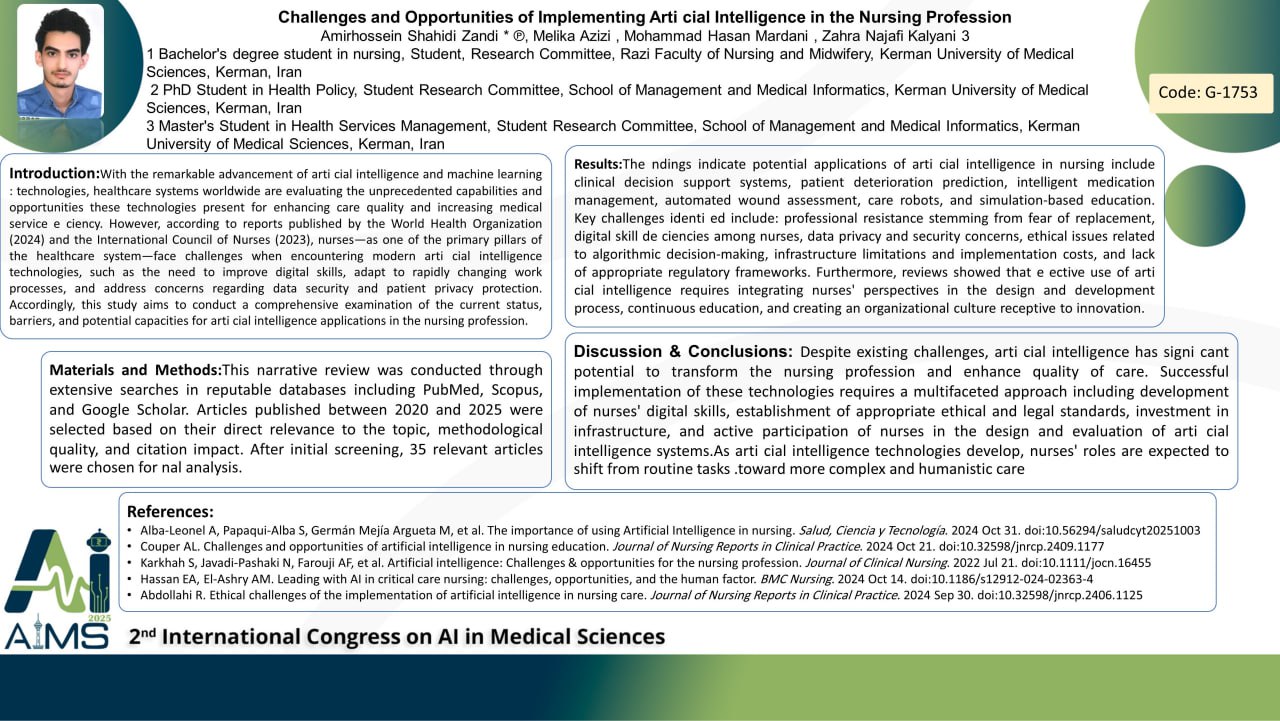Challenges and Opportunities of Implementing Artificial Intelligence in the Nursing Profession
Code: G-1753
Authors: Amirhossein Shahidi Zandi * ℗, Melika Azizi, Mohammad Hasan Mardani, Zahra Najafi Kalyani
Schedule: Not Scheduled!
Tag: Clinical Decision Support System
Download: Download Poster
Abstract:
Abstract
Background and Aims: With the remarkable advancement of artificial intelligence and machine learning technologies, healthcare systems worldwide are evaluating the unprecedented capabilities and opportunities these technologies present for enhancing care quality and increasing medical service efficiency. However, according to reports published by the World Health Organization (2024) and the International Council of Nurses (2023), nurses—as one of the primary pillars of the healthcare system—face challenges when encountering modern artificial intelligence technologies, such as the need to improve digital skills, adapt to rapidly changing work processes, and address concerns regarding data security and patient privacy protection. Accordingly, this study aims to conduct a comprehensive examination of the current status, barriers, and potential capacities for artificial intelligence applications in the nursing profession. Method: This narrative review was conducted through extensive searches in reputable databases including PubMed, Scopus, and Google Scholar. Articles published between 2020 and 2025 were selected based on their direct relevance to the topic, methodological quality, and citation impact. After initial screening, 35 relevant articles were chosen for final analysis. Results: The findings indicate potential applications of artificial intelligence in nursing include clinical decision support systems, patient deterioration prediction, intelligent medication management, automated wound assessment, care robots, and simulation-based education. Key challenges identified include: professional resistance stemming from fear of replacement, digital skill deficiencies among nurses, data privacy and security concerns, ethical issues related to algorithmic decision-making, infrastructure limitations and implementation costs, and lack of appropriate regulatory frameworks. Furthermore, reviews showed that effective use of artificial intelligence requires integrating nurses' perspectives in the design and development process, continuous education, and creating an organizational culture receptive to innovation. Conclusion: Despite existing challenges, artificial intelligence has significant potential to transform the nursing profession and enhance quality of care. Successful implementation of these technologies requires a multifaceted approach including development of nurses' digital skills, establishment of appropriate ethical and legal standards, investment in infrastructure, and active participation of nurses in the design and evaluation of artificial intelligence systems.As artificial intelligence technologies develop, nurses' roles are expected to shift from routine tasks toward more complex and humanistic care.
Keywords
Artificial Intelligence, Nursing, Ethics, Education,Digital Healthcare
